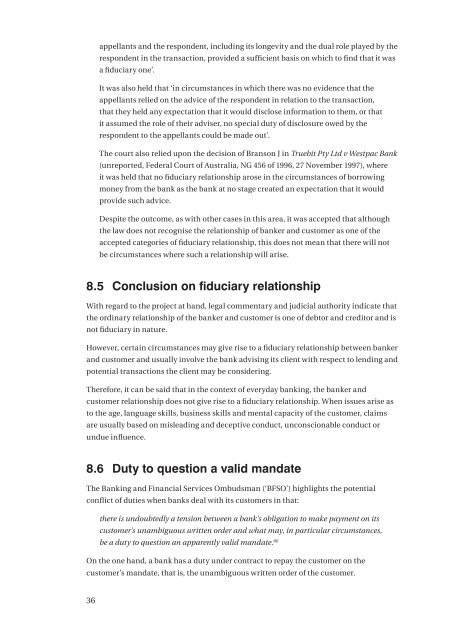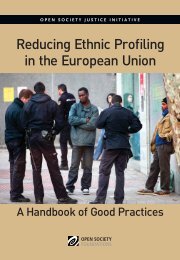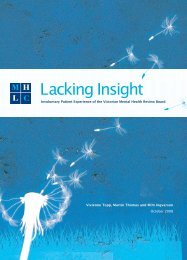Responding to the financial abuse of older people - Loddon ...
Responding to the financial abuse of older people - Loddon ...
Responding to the financial abuse of older people - Loddon ...
- No tags were found...
Create successful ePaper yourself
Turn your PDF publications into a flip-book with our unique Google optimized e-Paper software.
appellants and <strong>the</strong> respondent, including its longevity and <strong>the</strong> dual role played by <strong>the</strong><br />
respondent in <strong>the</strong> transaction, provided a sufficient basis on which <strong>to</strong> find that it was<br />
a fiduciary one’.<br />
It was also held that ‘in circumstances in which <strong>the</strong>re was no evidence that <strong>the</strong><br />
appellants relied on <strong>the</strong> advice <strong>of</strong> <strong>the</strong> respondent in relation <strong>to</strong> <strong>the</strong> transaction,<br />
that <strong>the</strong>y held any expectation that it would disclose information <strong>to</strong> <strong>the</strong>m, or that<br />
it assumed <strong>the</strong> role <strong>of</strong> <strong>the</strong>ir adviser, no special duty <strong>of</strong> disclosure owed by <strong>the</strong><br />
respondent <strong>to</strong> <strong>the</strong> appellants could be made out’.<br />
The court also relied upon <strong>the</strong> decision <strong>of</strong> Branson J in Truebit Pty Ltd v Westpac Bank<br />
(unreported, Federal Court <strong>of</strong> Australia, NG 456 <strong>of</strong> 1996, 27 November 1997), where<br />
it was held that no fiduciary relationship arose in <strong>the</strong> circumstances <strong>of</strong> borrowing<br />
money from <strong>the</strong> bank as <strong>the</strong> bank at no stage created an expectation that it would<br />
provide such advice.<br />
Despite <strong>the</strong> outcome, as with o<strong>the</strong>r cases in this area, it was accepted that although<br />
<strong>the</strong> law does not recognise <strong>the</strong> relationship <strong>of</strong> banker and cus<strong>to</strong>mer as one <strong>of</strong> <strong>the</strong><br />
accepted categories <strong>of</strong> fiduciary relationship, this does not mean that <strong>the</strong>re will not<br />
be circumstances where such a relationship will arise.<br />
8.5 Conclusion on fiduciary relationship<br />
With regard <strong>to</strong> <strong>the</strong> project at hand, legal commentary and judicial authority indicate that<br />
<strong>the</strong> ordinary relationship <strong>of</strong> <strong>the</strong> banker and cus<strong>to</strong>mer is one <strong>of</strong> deb<strong>to</strong>r and credi<strong>to</strong>r and is<br />
not fiduciary in nature.<br />
However, certain circumstances may give rise <strong>to</strong> a fiduciary relationship between banker<br />
and cus<strong>to</strong>mer and usually involve <strong>the</strong> bank advising its client with respect <strong>to</strong> lending and<br />
potential transactions <strong>the</strong> client may be considering.<br />
Therefore, it can be said that in <strong>the</strong> context <strong>of</strong> everyday banking, <strong>the</strong> banker and<br />
cus<strong>to</strong>mer relationship does not give rise <strong>to</strong> a fiduciary relationship. When issues arise as<br />
<strong>to</strong> <strong>the</strong> age, language skills, business skills and mental capacity <strong>of</strong> <strong>the</strong> cus<strong>to</strong>mer, claims<br />
are usually based on misleading and deceptive conduct, unconscionable conduct or<br />
undue influence.<br />
8.6 Duty <strong>to</strong> question a valid mandate<br />
The Banking and Financial Services Ombudsman (‘BFSO’) highlights <strong>the</strong> potential<br />
conflict <strong>of</strong> duties when banks deal with its cus<strong>to</strong>mers in that:<br />
<strong>the</strong>re is undoubtedly a tension between a bank’s obligation <strong>to</strong> make payment on its<br />
cus<strong>to</strong>mer’s unambiguous written order and what may, in particular circumstances,<br />
be a duty <strong>to</strong> question an apparently valid mandate. 86<br />
On <strong>the</strong> one hand, a bank has a duty under contract <strong>to</strong> repay <strong>the</strong> cus<strong>to</strong>mer on <strong>the</strong><br />
cus<strong>to</strong>mer’s mandate, that is, <strong>the</strong> unambiguous written order <strong>of</strong> <strong>the</strong> cus<strong>to</strong>mer.<br />
36
















